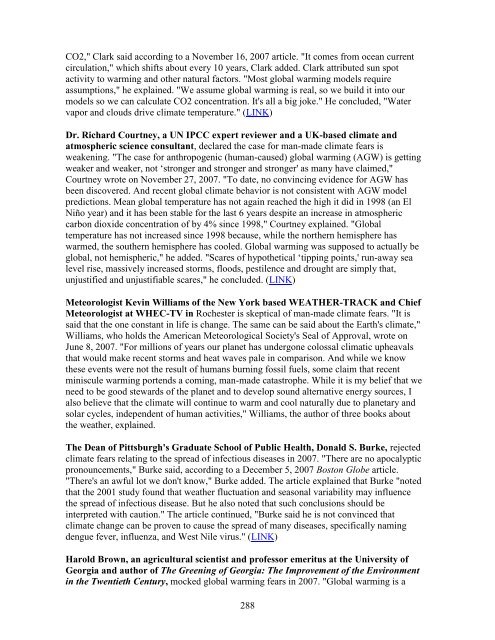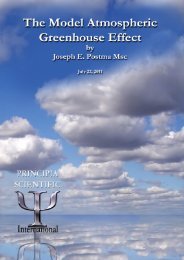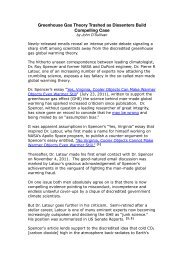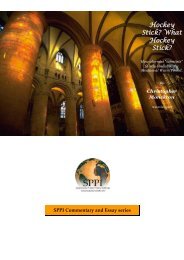Than 1000 International Scientists Dissent Over Man-Made Global ...
Than 1000 International Scientists Dissent Over Man-Made Global ...
Than 1000 International Scientists Dissent Over Man-Made Global ...
You also want an ePaper? Increase the reach of your titles
YUMPU automatically turns print PDFs into web optimized ePapers that Google loves.
CO2," Clark said according to a November 16, 2007 article. "It comes from ocean current<br />
circulation," which shifts about every 10 years, Clark added. Clark attributed sun spot<br />
activity to warming and other natural factors. "Most global warming models require<br />
assumptions," he explained. "We assume global warming is real, so we build it into our<br />
models so we can calculate CO2 concentration. It's all a big joke." He concluded, "Water<br />
vapor and clouds drive climate temperature." (LINK)<br />
Dr. Richard Courtney, a UN IPCC expert reviewer and a UK-based climate and<br />
atmospheric science consultant, declared the case for man-made climate fears is<br />
weakening. "The case for anthropogenic (human-caused) global warming (AGW) is getting<br />
weaker and weaker, not ‗stronger and stronger and stronger' as many have claimed,"<br />
Courtney wrote on November 27, 2007. "To date, no convincing evidence for AGW has<br />
been discovered. And recent global climate behavior is not consistent with AGW model<br />
predictions. Mean global temperature has not again reached the high it did in 1998 (an El<br />
Niño year) and it has been stable for the last 6 years despite an increase in atmospheric<br />
carbon dioxide concentration of by 4% since 1998," Courtney explained. "<strong>Global</strong><br />
temperature has not increased since 1998 because, while the northern hemisphere has<br />
warmed, the southern hemisphere has cooled. <strong>Global</strong> warming was supposed to actually be<br />
global, not hemispheric," he added. "Scares of hypothetical ‗tipping points,' run-away sea<br />
level rise, massively increased storms, floods, pestilence and drought are simply that,<br />
unjustified and unjustifiable scares," he concluded. (LINK)<br />
Meteorologist Kevin Williams of the New York based WEATHER-TRACK and Chief<br />
Meteorologist at WHEC-TV in Rochester is skeptical of man-made climate fears. "It is<br />
said that the one constant in life is change. The same can be said about the Earth's climate,"<br />
Williams, who holds the American Meteorological Society's Seal of Approval, wrote on<br />
June 8, 2007. "For millions of years our planet has undergone colossal climatic upheavals<br />
that would make recent storms and heat waves pale in comparison. And while we know<br />
these events were not the result of humans burning fossil fuels, some claim that recent<br />
miniscule warming portends a coming, man-made catastrophe. While it is my belief that we<br />
need to be good stewards of the planet and to develop sound alternative energy sources, I<br />
also believe that the climate will continue to warm and cool naturally due to planetary and<br />
solar cycles, independent of human activities," Williams, the author of three books about<br />
the weather, explained.<br />
The Dean of Pittsburgh's Graduate School of Public Health, Donald S. Burke, rejected<br />
climate fears relating to the spread of infectious diseases in 2007. "There are no apocalyptic<br />
pronouncements," Burke said, according to a December 5, 2007 Boston Globe article.<br />
"There's an awful lot we don't know," Burke added. The article explained that Burke "noted<br />
that the 2001 study found that weather fluctuation and seasonal variability may influence<br />
the spread of infectious disease. But he also noted that such conclusions should be<br />
interpreted with caution." The article continued, "Burke said he is not convinced that<br />
climate change can be proven to cause the spread of many diseases, specifically naming<br />
dengue fever, influenza, and West Nile virus." (LINK)<br />
Harold Brown, an agricultural scientist and professor emeritus at the University of<br />
Georgia and author of The Greening of Georgia: The Improvement of the Environment<br />
in the Twentieth Century, mocked global warming fears in 2007. "<strong>Global</strong> warming is a<br />
288





